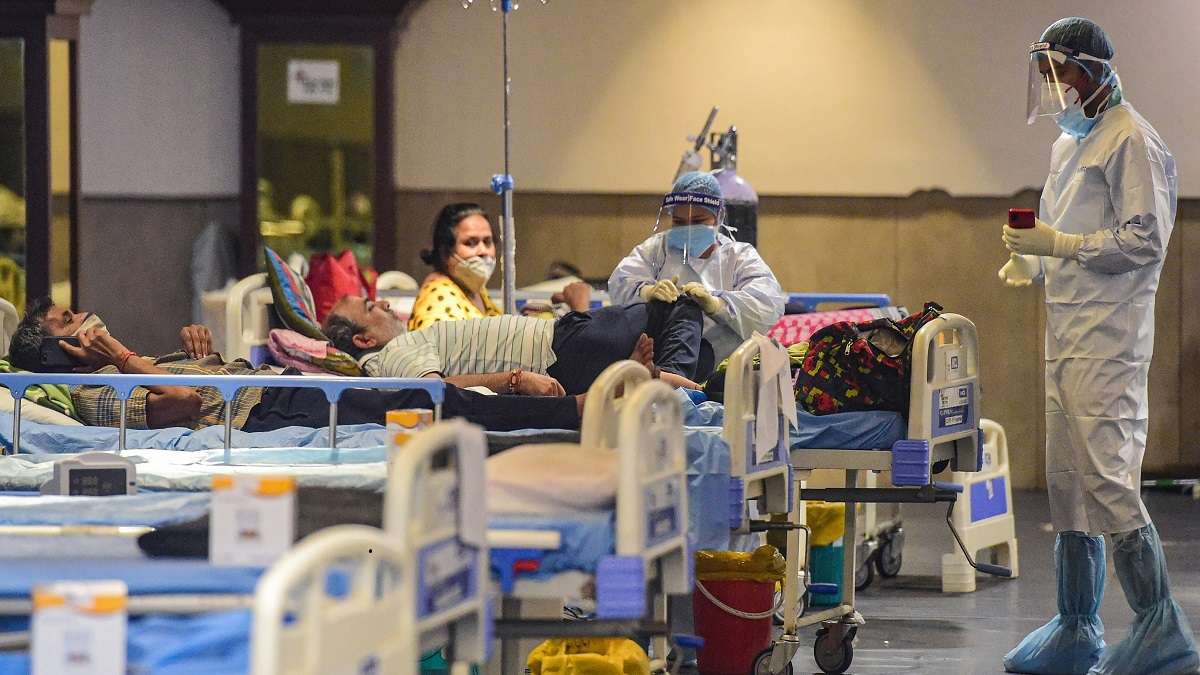An 84-year-old Covid positive man who was given monoclonal antibody therapy in Gurgaon, which is said to reduce the chance of hospitalisation by 70 per cent in patients with mild to moderate symptoms, is back to his home, hospital authorities said on Wednesday.
Mohabbat Singh was administered a cocktail of Casirivimab and Imdevimab at the Medanta Hospital as part of the "single dose infusion-based treatment" on Tuesday and then kept under observation.
"After being kept under observation, he was sent home yesterday only," a spokesperson of the hospital said.
An official of the hospital claimed it was Delhi-NCR's first case of monoclonal antibody therapy for a Covid patient.
Suffering from COVID-19, Singh is the first patient to receive monoclonal antibody therapy at Medanta, Gurgaon, he said."The antibody combination of Casirivimab and Imdevimab, now available in India is a cutting-edge treatment that will provide protection to COVID-19 positive patients with mild or moderate symptoms before they deteriorate further or require hospitalisation," the hospital said in a statement.
"This FDA approved therapy demonstrated good efficacy in Phase 1/2 and Phase 3 studies by reducing COVID-19 related hospitalisation and death by 70 per cent. Approved by the Drugs Controller General of India (DCGI), this single dose infusion-based treatment can be provided on an outpatient or on day care basis, and marks a dramatic shift in COVID-19 care in India," it added.
Similar to antibodies which are proteins that the body naturally produces to defend itself against the disease, monoclonal antibodies are artificially created in a lab and tailor-made to fight the disease they treat, hospital authorities said.
"Casirivimab and Imdevimab are monoclonal antibodies that are specifically directed against the spike protein of SARS-CoV-2, designed to block the virus' attachment and entry into human cells," the statement said.
"Two distinct antibodies bind non-competitively to the COVID-19 virus cell surface and prevent the virus from infecting healthy cells. Using two antibodies protects against emergence of resistance," it said.
The therapy is most suited for "high-risk COVID-19 patients" who are within the first 10 days of symptom onset and meet any of the listed criteria, such as, age being 65 years or above, the hospital said.
Other criteria include, obesity with body mass index (BMI) of more than 35; or type-1 or type-2 diabetes mellitus; or chronic kidney disease, including those on dialysis; or chronic liver disease; or currently receiving immunosuppressive treatment; or if aged above 55, having either heart disease, or hypertension, or chronic lung disease, the statement said.
Patients are advised to check with their doctor if monoclonal antibody therapy may be beneficial to them in the treatment of their COVID-19 infection, hospital authorities said.
"We are glad to now have access to monoclonal antibody therapy in India. This fast and effective treatment for COVID -19 will save patients at highest risk from falling critically ill, getting hospitalized or possibly dying of complications from COVID-19. We look forward to serving our patients with this therapy and saving more lives,” said Dr Naresh Trehan, Chairman and Managing Director, Medanta.
High risk patients between the 12-17 years of age weighing at least 40 kg may also be eligible if they have any of the following conditions -- BMI of 85th percentile or more for their age and gender based on CDC growth charts; sickle cell disease, or congenital or acquired heart disease neurodevelopmental disorders; medical-related technological dependence, example tracheostomy, gastrostomy or positive pressure ventilation (not related to COVID-19), asthma, reactive airway or other chronic respiratory disease that requires daily medication for control, the statement said.
The therapy is not recommended in patients who are hospitalised due to severe COVID-19, require oxygen therapy due to COVID-19 or require an increase in baseline oxygen flow rate due to COVID-19 or those on chronic oxygen therapy due to underlying non-Covid-19 related co-morbidity, it said.
Sources said a leading private facility in Delhi was likely to start the therapy at the hospital from Thursday.

